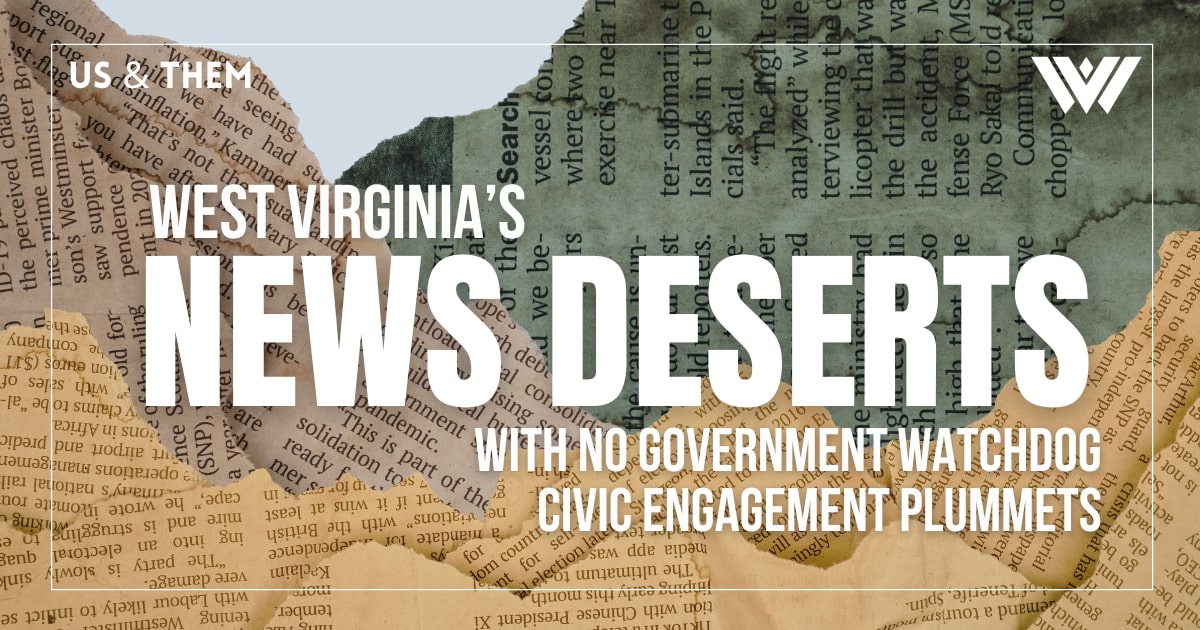Every week across the U.S., more than two newspapers go out of business. In the past two decades, more than 3,000 papers have shut down operations. That’s left more than 1,500 counties as so-called news deserts.
Forty-three of West Virginia’s 55 counties have just one local news source and that limited access gives the state a ranking of 46th out of all 50 states. Studies show when local news sources vanish, the result is a drop in community participation on many levels.
On the next episode of Us & Them, host Trey Kay visits some regional news deserts to talk about the way local news organizations help a community see and define itself. Some say local coverage is the glue that brings a place together, and in Putnam County, The Hurricane Breeze continues to offer essential local news while in Greenbrier County, a startup is working to bring back that voice.
This episode of Us & Them is presented with support from the Greater Kanawha Valley Foundation and the CRC Foundation.
Subscribe to Us & Them on Apple Podcasts, NPR One, RadioPublic, Spotify, Stitcher and beyond.
Photo courtesy of Jenna Braunstein
“I think local news organizations are the glue that binds together a community. It’s where people in a community go to see themselves and go to see their community, and the people who live there… And so when you lose that original local news reporting and coverage, I think it contributes to this disconnectedness… Civic participation declines. Turnout in local elections goes down. The number of candidates running for local office goes down… In some cases, government spending rises and government borrowing costs also go up, this is according to a study done by Notre Dame and the University of Illinois-Chicago, because the bond rating agencies look at the fact there’s no watchdog, there’s no journalist in that community covering government officials and so the fear is that government spending is just going to rise further.”
— Tim Franklin, Director of the Local News Initiative at Northwestern University’s Medill School of Journalism.
Learn more about the Northwestern/Medill Local News Initiative.

Photo Credit: Trey Kay/West Virginia Public Broadcasting
Read the latest and archived editions of The Hurricane Breeze Newspaper.

Photo Credit: Trey Kay/West Virginia Public Broadcasting
“I’m 82, going on 83 and I don’t believe that there’s anyone that’s going to step in and do what I continue to do.”
— Ron Allen, owner and publisher of The Hurricane Breeze
“I’d definitely like to see the family legacy continue. The paper has been part of my family since 1913. But there’s too much work for one person to do… In fact, there’s too much work for two people to do, but we make it happen.”
— Betsy Allen, producer of The Hurricane Breeze



Ron and Betsy Allen produce The Hurricane Breeze from their rural home outside the main part of Hurricane, W.Va. Just beyond the doorway where they put together the local newspaper is a large chicken coop and a pasture where cattle graze.
Photo Credit: Trey Kay/West Virginia Public Broadcasting

Photo courtesy of West Virginia Public Broadcasting
“Local news is important because it talks about what’s happening in your community, in your backyard. If you’re commuting from Huntington to Charleston, what’s going on, on I-64… that’s going to bog you down or hold you up, besides construction and accidents… There’s a wide spread of counties that WSAZ’s signal goes to — much of western West Virginia, about 10 counties in southern Ohio and about 10 counties in eastern Kentucky. I was the reporter that would often go to the ends of the earth, if you will, because I could get the story and get back quick for the four, five and six o’clock news.”
— Randy Yohe, Huntington bureau chief for West Virginia Public Broadcasting News and former on-air reporter for WSAZ-NewsChannel 3.
Watch Randy Yohe’s career retrospective.

Photo Credit: Trey Kay/West Virginia Public Broadcasting
“Being a state senator representing 100,000 people in addition to having church ministry is a couple of full-time jobs…
Then suddenly I only had one full-time job. I’m used to doing a lot more than that… The thing that I liked most about public service was telling stories, sharing West Virginia’s story, making sure folks knew what was going on because I was representing six counties, 100,000 people, and every day I was traveling those six counties and so many people didn’t know what was going on one mountain over…
Somebody can read [The Real West Virginia] and one time they might think, oh, well, this is from a Democratic perspective, or another time they’re not going to be sure. We like that because we think that is authentic to West Virginians… We’ve had this shift toward Republican politics away from Democratic politics. But West Virginians have always been pretty partisan one way or another. We don’t think that’s necessarily representative of the way West Virginians operate. So we would like to operate as an outlet that folks aren’t sure from day to day, article to article, what the perspective is.”
— Stephen Baldwin, owner and publisher of The Real West Virginia.
Read the latest and archived editions of The Real West Virginia.



